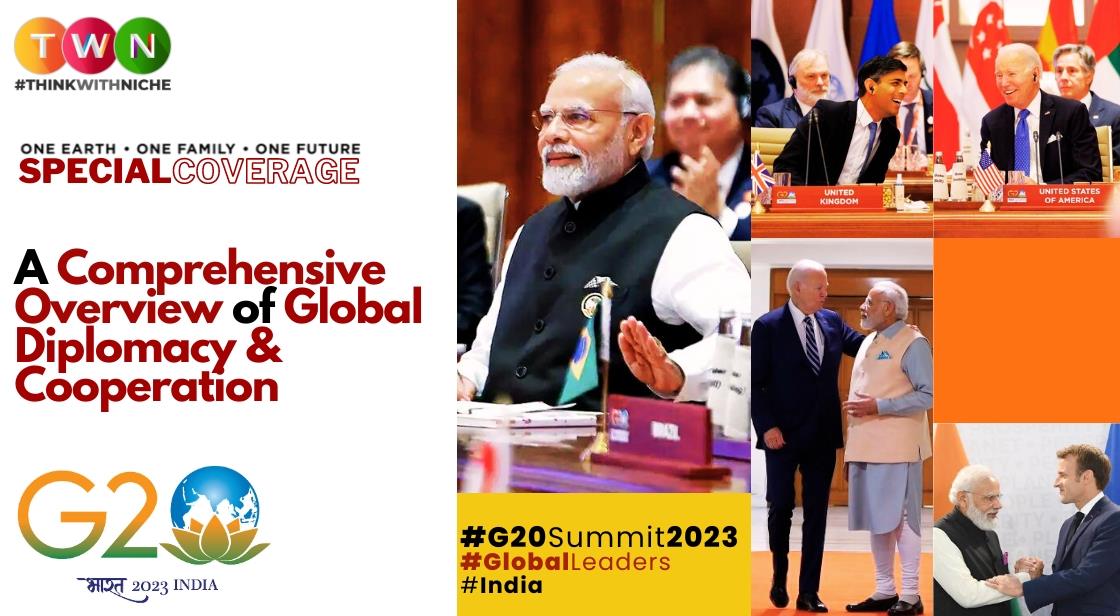The G20 Summit: A Comprehensive Overview of Global Diplomacy and Cooperation

Blog Post
As it's widely recognized, with world leaders assembling in New Delhi for the G20 Heads of State and Government Summit, we are on the brink of a pivotal moment in global diplomacy and economic collaboration.
This grand event of G20 Summit 2023, to be held on 9-10 September, marks the conclusion of India's year-long presidency of the G20.
A role that has seen the country lead the discussion on serious global issues. The culmination of the summit will be the adoption of the G20 Leaders' Declaration, a document that reflects the participating leaders' commitment to the priorities discussed and agreed upon during the Ministerial and Working Group meetings held in the lead-up to this historic event.
Under the majestic lights of the Bharat Mandap at Pragati Maidan, with its stunning floral decorations and the imposing 28-foot-tall Nataraja statue, the G20 Summit will be held on the theme of “One Earth, One Family, One Future,” Running with an optimistic objective.
The theme symbolizes a shared vision of unity and progress, echoing the core principles that drive this esteemed gathering of nations.
In this comprehensive journey, we will be introduced to the history, structure and purposes of the G20 and highlight how it has evolved from a financial forum to a global powerhouse of economic cooperation.
We delve deeper into its origins, tracing its roots to the transformative global landscape of the early 1990s and the key moments that placed it at the forefront of international diplomacy.
We will analyze the G20's work structure, focusing on its three major tracks: covering the breadth of discussions and policymaking that take place within the G20 framework.
And as we uncover the story of the G20, we also explore the important role of the G20 presidency, from setting the annual agenda to hosting meetings and summits, and even extending invitations to other countries and organizations.
Till then, let us examine its responsibilities and effects. The G20 will also create a comprehensive understanding on processes.
Join us on this enlightening journey from the beginning of the G20 Summit to the outcomes that will shape the global economic landscape in the years to come.
Learn how this remarkable platform continues to adapt and evolve in response to the dynamic challenges of our changing world.
Leaders from the world's most influential nations are converging on New Delhi for the G20 Heads of State and Government Summit scheduled for September 9-10.
This summit marks the culmination of India's year-long presidency of the G20, with the event concluding with the adoption of a G20 Leaders' Declaration.
This declaration will articulate the commitment of participating leaders to the priorities discussed and agreed upon during ministerial and working group meetings held in the lead-up to the summit.
The magnificence of the primary venue, Bharat Mandapam, located in Pragati Maidan, is a sight to behold. Adorned with enchanting illuminations, intricate floral decorations, and a remarkable 28-foot-tall statue of Nataraja, it creates a captivating ambiance that perfectly befits this historic occasion.
The summit carries the optimistic banner of "One Earth, One Family, One Future," reflecting a shared vision of unity and progress.
The G20 Summit: A Comprehensive Overview of Global Diplomacy and Cooperation
Let's start from the its origins,significance and its objectives.
History of the G20 Summit
The G20 Summit was first held in 1999 in Berlin, Germany. The summit was attended by the leaders of the Group of Seven (G7) countries, plus Russia, China, Mexico, and Indonesia. The G7 countries are Canada, France, Germany, Italy, Japan, the United Kingdom, and the United States.
The G20 Summit was created in response to the Asian financial crisis of 1997-1998. The crisis showed the need for a more inclusive forum for discussing global economic issues. The G20 includes the G7 countries, which are the world's largest economies, plus major emerging economies such as China, India, and Brazil.
The G20 Summit has been held every year since 1999. The summit has been hosted by a different country each year. The 2023 G20 Summit will be held in India.
The agenda of the G20 Summit has evolved over the years. In the early years, the summit focused on economic issues such as financial stability and trade. In recent years, the summit has also addressed a wider range of issues, including climate change, terrorism, and poverty.
The G20 Summit has been credited with helping to stabilize the global economy during the financial crisis of 2008-2009. The summit has also been used to promote cooperation on issues such as climate change and terrorism.
The G20 Summit is not without its critics. Some critics argue that the summit is dominated by the G7 countries and that the interests of emerging economies are not adequately represented. Others argue that the summit is too focused on economic issues and that it should address a wider range of issues.
Despite its critics, the G20 Summit remains an important forum for discussing global issues and for promoting cooperation between the world's largest economies. The summit is likely to continue to play an important role in global governance in the years to come.
Notable Achievements from Past G20 Summits:
-
During the 2009 G20 Summit held in London, a consensus was reached to implement a substantial $1.1 trillion stimulus package aimed at facilitating the global economic revival following the financial crisis.
- The 2010 G20 Summit in Toronto agreed to new regulations for the financial sector to prevent another crisis.
- The 2011 G20 Summit in Cannes agreed to a plan to reduce global imbalances in trade and investment.
- The 2012 G20 Summit in Los Cabos agreed to a plan to combat climate change.
- The 2013 G20 Summit in Saint Petersburg agreed to a plan to promote sustainable development.
- The 2014 G20 Summit in Brisbane agreed to a plan to boost global growth.
- The 2015 G20 Summit in Antalya agreed to a plan to implement the Paris Agreement on climate change.
- The 2016 G20 Summit in Hangzhou agreed to a plan to promote free trade.
- The 2017 G20 Summit in Hamburg agreed to a plan to fight terrorism.
- The 2018 G20 Summit in Buenos Aires agreed to a plan to reform the World Trade Organization.
- The 2019 G20 Summit in Osaka agreed to a plan to promote sustainable infrastructure.
- The 2020 G20 Summit in Riyadh was held virtually due to the COVID-19 pandemic. The summit agreed to a plan to support the global economy during the pandemic.
- The 2021 G20 Summit in Rome agreed to a plan to accelerate the global transition to a clean energy economy.
The 2023 G20 Summit is expected to focus on issues such as the global economy, climate change, and food security. The summit is also expected to address the war in Ukraine and its impact on the global economy.
Also Read: G20 Summit 2023 Unites World Leaders in Incredible India : Diplomatic Grandeur
Agenda of the G20 Summit
The agenda of the G20 Summit is set by the host country. The 2023 G20 Summit is expected to focus on issues such as the global economy, climate change, and food security.
The global economy is likely to be a major focus of the 2023 G20 Summit. The world economy is still recovering from the COVID-19 pandemic, and the war in Ukraine is creating new challenges. The G20 leaders are expected to discuss ways to boost economic growth and to promote stability.
Climate change is another major issue that is likely to be discussed at the 2023 G20 Summit. The G20 countries are the world's largest emitters of greenhouse gases, and they have a responsibility to take action on climate change. The G20 leaders are expected to discuss ways to reduce emissions and to transition to a clean energy economy.
Food security is also likely to be a topic of discussion at the 2023 G20 Summit. The war in Ukraine has disrupted global food supplies, and the G20 leaders are expected to discuss ways to address this issue.
Significance of the G20 Summit
The G20 Summit is a significant event in global diplomacy and cooperation. The summit provides an opportunity for the leaders of the world's largest economies to discuss important issues and to coordinate their efforts to address these issues.
The G20 Summit is also a forum for the G20 countries to demonstrate their commitment to global cooperation. The summit is an opportunity for the G20 leaders to show that they are willing to work together to address the challenges facing the world.
What Is the G20, and What Are Its Functions?
The G20, officially known as the Group of Twenty, is composed of 19 countries (Argentina, Australia, Brazil, Canada, China, France, Germany, India, Indonesia, Italy, Japan, Republic of Korea, Mexico, Russia, Saudi Arabia, South Africa, Turkey, United Kingdom, and the United States) along with the European Union. Collectively, these members represent a substantial portion of the global economy, accounting for approximately 85 percent of global GDP, over 75 percent of global trade, and nearly two-thirds of the world's population.
The G20 serves as a vital platform for international economic cooperation, where it plays a pivotal role in shaping and fortifying global structures and governance concerning major international economic issues. Among its primary objectives are:
-
Policy Coordination: Facilitating policy coordination among member nations to attain global economic stability and sustainable growth.
-
Financial Regulation: Promoting financial regulations that mitigate risks and preempt future financial crises.
-
International Financial Architecture: Fostering the development of a new international financial architecture.
When and Why Did the G20 Come into Existence?
The genesis of the G20 can be traced back to significant global shifts in the early 1990s. With the dissolution of the Soviet Union in 1991, the Cold War era came to an end. Simultaneously, robust economies emerged in the Global South, exemplified by countries like Brazil, China, and India. This transformative global landscape called for reforms in global governance and international institutions.
The existing forums, such as the G7, and international organizations like the World Bank, proved inadequate in managing crises within this evolving global order. The need for a more inclusive and dynamic platform became evident.
In 1997, the Asian financial crisis erupted, affecting the rapidly growing economies of East Asia and subsequently spreading to Latin America. It was against this backdrop that the G22, an early version of the G20, was established in 1998. Initially conceived as a one-time crisis-response gathering, it quickly evolved to include 33 members (known as G33) tasked with discussing reforms in the global economy and the international financial system.
In late 1999, the G20, in its present composition, emerged as an informal forum for Finance Ministers and Central Bank Governors of member nations. This annual meeting has since become a vital platform for addressing global economic challenges and fostering international cooperation.
The G20 continues to evolve, reflecting the dynamic nature of global economics and governance.
The Working Structure of the G20
The G20, comprising leaders from the world's foremost economies, operates within a well-defined working structure that encompasses three major tracks:
1. Finance Track
The Finance Track is steered by finance ministers and central bank governors, convening approximately four times annually. Within this track, critical discussions revolve around fiscal and monetary policy matters that have a far-reaching impact on the global economy.
Key areas of focus include:
-
Global Economy: Assessment and strategies for fostering global economic stability.
-
Infrastructure: Discussion of infrastructure development to promote economic growth.
-
Financial Regulation: Deliberations on financial sector regulations and reforms.
-
Financial Inclusion: Efforts to ensure financial services are accessible to all.
-
International Financial Architecture: Evaluation of the global financial system's structure.
-
International Taxation: Addressing international taxation issues on a global scale.
At present, the Finance Track comprises eight working groups that delve into these crucial areas, driving policy discussions and recommendations.
2. Sherpa Track
The Sherpa Track, established in 2008 alongside the G20 Leaders' Summit, is helmed by Sherpas—appointed representatives of member countries' presidents or prime ministers. This track zeroes in on a wide spectrum of socio-economic issues, including:
-
Agriculture: Strategies for sustainable agricultural practices.
-
Anti-Corruption: Efforts to combat corruption on a global scale.
-
Climate: Discussions on climate change mitigation and adaptation.
-
Digital Economy: Advancements and regulations in the digital sphere.
-
Education: Initiatives for quality education worldwide.
-
Employment: Policies to foster global employment opportunities.
-
Energy: Strategies for sustainable and clean energy sources.
-
Environment: Measures to address environmental challenges.
-
Health: Collaborative efforts in global health crises.
-
Tourism: Promotion of sustainable and responsible tourism.
-
Trade: Trade policies and agreements among member nations.
-
Investment: Strategies for fostering global investment.
Currently, the Sherpa Track comprises 13 working groups, each contributing to policy formulation and recommendations in their respective areas.
3. Engagement Groups
The third and unofficial track of the G20 consists of Engagement Groups, which comprise non-governmental participants from each member country. These groups play a pivotal role by drafting recommendations to G20 leaders. Their input contributes to the policy-making process on various issues. Presently, there are 11 Engagement Groups, covering diverse areas of global concern.
When Did the G20 Leaders' Summit Commence and Why?
Between 1999 and 2008, the G20 operated somewhat inconspicuously, with its annual meetings not carrying the significance they do today. The turning point for the G20 came with the global financial crisis of 2008.
This crisis, regarded as the most severe economic downturn since the Great Depression of 1929-1939, propelled the G20 into its current prominent role. As the world grappled with the profound economic turmoil, France, then holding the EU presidency, advocated for an emergency summit to address the crisis.
However, the question arose: Who should be invited to this critical summit? The G8, composed of Canada, France, Germany, Italy, Japan, Russia, the UK, and the US, while influential, lacked the collective capacity to stabilize a crisis of such magnitude.
Typically, diplomats would engage in lengthy deliberations to determine the countries to be invited. But given the urgency of the ongoing crisis, time was of the essence. The G20 emerged as the logical choice.
The inaugural G20 Leaders' Summit, known as the 'Summit on Financial Markets and the World Economy,' was convened in Washington, D.C., in November 2008. In addition to the leaders of the 20 member nations, heads of the International Monetary Fund (IMF) , the World Bank, and the United Nations received invitations, along with representatives from Spain and the Netherlands. Since then, annual summits have become a fixture on the global stage.
Responsibilities of the G20 Presidency
As previously mentioned, assuming the G20 presidency entails several key responsibilities:
-
Setting the Agenda: The presidency is tasked with establishing the G20's agenda for the year. This process involves consultations with other member countries and taking into account pertinent global developments.
-
Hosting Meetings and Summits: The G20 president is responsible for hosting various meetings throughout the year, culminating in the G20 Leaders' Summit. This summit represents the culmination of the group's collective efforts at lower levels of engagement. The presidency oversees all logistical arrangements and, in the absence of a permanent secretariat, provides the necessary human and material resources to facilitate the forum's activities for the year.
-
Inviting Guest Countries and Organizations: The G20 president holds the authority to extend invitations to other countries and organizations to participate in G20 processes for the year. This serves to broaden the scope of engagement and collaboration within the G20 framework.
Conclusion
In conclusion, the G20, or Group of Twenty, has evolved into a critical platform for international economic cooperation and policy coordination among the world's most influential nations. With a membership representing a significant portion of global GDP, trade, and population, the G20 addresses a wide array of pressing global challenges, from economic stability and financial regulation to climate change and sustainable development.
The G20's genesis in the late 1990s was a response to transformative shifts in the global landscape, and it has since played a vital role in shaping and fortifying global governance structures. Over the years, it has expanded its working structure to include finance, sherpa, and engagement tracks, each focusing on different aspects of socio-economic and global issues.
The pivotal moment in the G20's history came during the global financial crisis of 2008 when it emerged as the key forum for addressing the severe economic downturn. Since then, annual G20 Leaders' Summits have become essential gatherings for world leaders to collaborate on solving pressing global challenges.
As India takes on the presidency of the G20, it carries the responsibility of setting the agenda and hosting the year's meetings, including the G20 Leaders' Summit. This summit, under the theme "One Earth, One Family, One Future," is expected to yield a Leaders' Declaration that outlines the commitments and priorities of participating nations.
In an interconnected world, the G20 remains an indispensable forum for fostering international cooperation, addressing global issues, and steering the course of the global economy toward stability and sustainability. The G20 summit 2023 in New Delhi marks another significant chapter in this ongoing mission of collective action for a better future.
You May Like
EDITOR’S CHOICE












